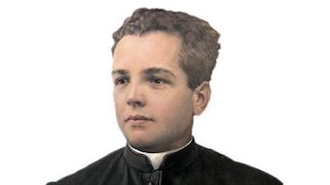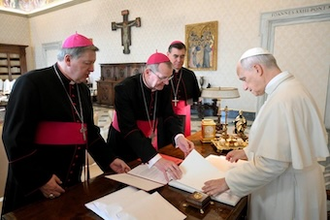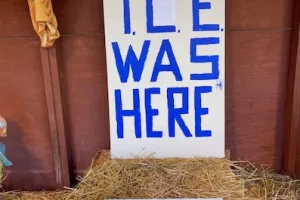Poland: Martyred priest beatified in Krakow

Blessed Michał Rapacz
Source: Vatican Media/Archdiocese of Krakow
On Saturday, 15 June, Cardinal Marcello Semeraro, Prefect of the Dicastery for the Causes of Saints presided over the beatification in Krakow, of martyred diocesan priest, Fr Michał Rapacz, who was killed at the age of 42 by the communist regime in 1946.
The Cardinal praised his legacy in "spreading love for Christ" as "the only effective antidote to atheism, materialism and all worldviews that threaten human dignity."
He described the beatification of Fr Michał Rapacz as "a sign of consolation from God, during times still wounded by violence and war in many parts of the world and not far from here."
Fr Michał was killed' in hatred of the faith', on 12 May 1946 in Płoki during the time of the communist regime when he was serving as a parish priest.
A group of armed men entered the rectory during the night, kidnapped him and killed him in a nearby forest. He was 42 years old.
Saturday's celebration took place at the Divine Mercy Shrine of Łagiewniki, consecrated by Saint John Paul II on 17 August 2002. The place of worship with its modern style and elliptical shape is where Saint Faustina Kowalska is buried, the apostle of the devotion to Divine Mercy to whom Pope John Paul II was very attached.
Large crowds gathered both inside and outside the church on what was a warm sunny day, together with clergy from the Archdiocese of Krakow and other Polish dioceses. Cardinal Semeraro said that from here, a message of "hope and consolation rises over the entire Polish nation and the whole world."
Dwelling on the significance of the Eucharist as the "sacrament of mercy," Cardinal Semeraro recalled words of Pope Francis saying it "is not a reward for the good, but it is strength for the weak, for sinners. It is forgiveness, it is what that helps us to go forward, to continue on our journey."
With this perspective, he continued, "nourished by the Eucharistic Bread, we too can say our 'yes', which is the commitment to make and live radical, courageous, even difficult choices. He said this 'yes' is a different way of responding to evil by doing good, becoming builders of peace and embracing the ideals of that high standard of Christian life that the Saints, with their witnesses, help us see," by offering themselves "with generosity in service to the least, the poor, the marginalised, the smallest and most defenceless."
Cardinal Semeraro said in his homily, Father Rapacz's example that we can follow shows how "the Eucharist was the foundation of his life as a man of God."
"Spreading love for Christ present in the consecrated Bread, was for him the only effective antidote to atheism, materialism and all those worldviews that threaten human dignity." And it is "from the gift of Jesus on the altar" that this parish priest of Płoki "drew the greatest love, the love that does not remain paralysed in the face of hatred, violence and everything that causes fear."
A pastor of souls rooted in charity, Cardinal Semeraro recalled how Fr Michał kept a firm the resolution: "I am ready to give my life for my sheep."
The Cardinal invited young people to look to the martyred priest as an "encouragement to embrace the Gospel of Jesus with one's whole self," as Fr Rapacz during his life "gained the greatest wisdom: that of knowing how to discern to whom to hand over one's whole self," aware that "responding generously to the Christian vocation is always answering the call to be saints that God addresses to every man and woman."
Cardinal Semeraro then recalled "the continual need for spirituality" that animated the new blessed, moving him every night to enter the church and prostrate himself on the ground, in the form of a cross before the tabernacle to pray "for the families and people of his community." Thus, Cardinal Semeraro added, Fr Michał Rapacz "teaches that not only is the Eucharist the source of good, but it is also its fulfilment, as one finds shelter from the turmoil of life and answers to what one seeks and needs. To adore the Eucharist is also to give back to Jesus Christ ourselves and all our needs so that we can experience His liberating and transforming power."
At the same time, Fr Rapacz represents an invitation for all priests to "believe in the power of the Eucharist, the only one through which each of us can become as he was a faithful and generous witness to the Gospel to the point of giving his life for it," Cardinal Semeraro stressed. "People, our communities, the whole Church need our 'yes,' the willingness to let our lives be conformed to the mystery we celebrate at the altar," he continued.
Referring to the forthcoming Jubilee centred on the motto 'Pilgrims of Hope,' the Prefect called it "an experience of true hope, an experience as great as the whole world," with the most convincing testimony offered precisely by the martyrs who, "steadfast in their faith in the risen Christ, they renounced life itself here below, rather than betray their Lord." (Spes non confundit, 20).
During the celebration, which was also attended by two of Fr Michał's great-grandnephews, a reliquary in the form of a cross intertwined with olive branches was brought to the altar containing the mortal remains of the new Blessed, obtained during the exhumation of his remains last April.
Archbishop Marek Jędraszewski has decided that the remains of Father Rapacz will now rest at the side altar of the parish church in Płoki, the main site of veneration of the new Blessed.
The day after the beatification during the Sunday Angelus, Pope Francis praised Blessed Fr Rapacz as "a pastor according to the heart of Christ, and a faithful and generous witness of the Gospel" who lived through both the Nazi and Soviet persecution, but responded to it "with the gift of his life" through service to others and witness to faith.


















